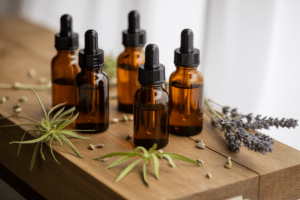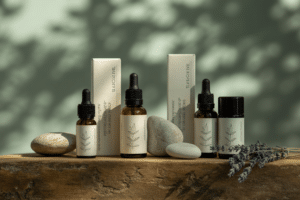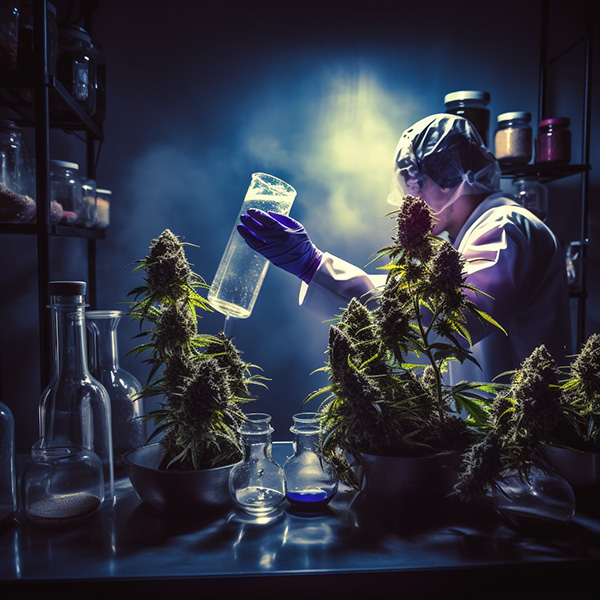- Insights and Future Outlook
PHC Cannabinoid: Complete Safety Guide & Legal Update [2026]

Contents
Contents
Introduction to PHC (Hydrox4phc) Cannabinoid
⚠️ Critical Legal Update – January 2026
In November 2025, Congress enacted legislation that effectively bans most intoxicating hemp products, including PHC and other converted cannabinoids. These restrictions take effect in November 2026. Read our full coverage: Trump Signs Bill Banning Hemp-Derived THC and CBD Products.
PHC Cannabinoid, also known as Hydrox4phc, emerged as an innovative semi-synthetic compound in the cannabis industry. This cannabinoid offered unique benefits while maintaining federal legal status under the 2018 Farm Bill—though that status is now changing dramatically due to new federal legislation.
Key Points About PHC Cannabinoid
- Origin: Semi-synthesized from Delta-9 acetate, which is derived from CBD.
- Effects: Produces euphoric and relaxing effects similar to THC.
- Legal Status: CHANGING – Federal ban takes effect November 2026.
- Applications: Previously used for both recreational and therapeutic purposes.
Unlike naturally occurring cannabinoids such as THC and CBD, PHC is created through specialized extraction and transformation processes. This semi-synthetic nature is precisely what has placed it in the crosshairs of new federal regulations.
Why PHC Matters in 2026
The story of PHC represents a significant chapter in cannabis regulation history:
- The end of the “Farm Bill loophole” that allowed converted cannabinoids to flourish.
- A shift to “total THC” standards that will affect all hemp-derived products.
- New opportunities for naturally-derived alternatives as the market adapts.
- Important lessons for consumers about staying informed on regulatory changes.
Understanding PHC (Hydrox4phc): Properties and Production
The Science Behind PHC Cannabinoid
PHC (Hydrox4phc) represented a breakthrough in cannabinoid development through its innovative semi-synthetic production process. Created from Delta-9 acetate and CBD, this compound showcased how modern science could transform natural cannabis compounds.
Chemical Composition and Structure
- Derived from CBD through specialized extraction.
- Molecularly similar to THC.
- Semi-synthetic compound.
- Created through precise chemical processes.
PHC closely mirrors THC in its psychoactive effects while maintaining distinct characteristics:
- Euphoric Effects: Comparable to traditional THC.
- Relaxation: Users report significant calming properties.
- Duration: Effects can vary based on consumption method.
- Potency: Offers consistent strength due to controlled production.
Production Methods Now Under Scrutiny
The new federal legislation specifically targets cannabinoids that are “synthesized or manufactured outside the plant.” This directly impacts PHC production:
- Chemical conversion from CBD is now classified as manufacturing.
- Semi-synthetic processes fall outside the new hemp definition.
- Only naturally-occurring cannabinoids remain protected.
- Quality control measures may not satisfy new regulatory requirements.
Major Federal Legal Changes: 2025-2026 Update
🚨 Federal Hemp Ban: What You Need to Know
On November 12, 2025, as part of a government spending package (H.R. 5371), Congress enacted the most significant changes to federal hemp policy since the 2018 Farm Bill.
- Effective Date: November 2026
- Converted cannabinoids banned: Delta-8, Delta-10, HHC, THCP, PHC, and similar compounds
- New “Total THC” standard: Replaces Delta-9-only measurement
- Strict container limits: Max 0.4mg total intoxicating cannabinoids per container
Key Legislative Changes
| Aspect | Before (2018 Farm Bill) | After (November 2026) |
|---|---|---|
| THC Measurement | Delta-9 THC only (≤0.3%) | Total THC (≤0.3%) |
| Converted Cannabinoids | Legal (loophole) | Banned |
| Container Limits | No federal limit | Max 0.4mg total cannabinoids |
| PHC Status | Federally legal | Federally banned |
What This Means for PHC
As a hydrogenated/converted cannabinoid, PHC falls squarely under the new exclusions for cannabinoids that are “synthesized or manufactured outside the plant.” This means:
- PHC products will become federally illegal in November 2026.
- Interstate commerce of PHC products will be prohibited.
- Retailers will need to remove PHC products from shelves.
- Consumers should plan accordingly before the deadline.
Legislative Efforts to Reverse the Ban
There is active legislative pushback against these changes:
- Congresswoman Nancy Mace (R-SC) introduced a bill on November 20, 2025 to repeal the hemp provisions.
- Two U.S. Senators have introduced legislation to maintain hemp legality while adding regulations.
- The hemp industry is actively advocating for reversal before November 2026.
State-by-State Delta-8/PHC Legal Status [2026 Update]
💡 Important Note
While state laws still apply, the new federal ban will override state allowances for converted cannabinoids like PHC starting November 2026. The information below reflects current state positions as of January 2026.
States Where Delta-8/PHC is Currently Banned
The following states have explicitly banned Delta-8 THC and similar converted cannabinoids:
- Alaska
- Colorado
- Delaware
- Idaho
- Iowa
- Minnesota
- Montana
- Nevada
- New York
- North Dakota
- Oregon
- Rhode Island
- South Carolina
- Utah
- Vermont
- Washington
States with Regulated Delta-8 Markets
These states allow Delta-8/PHC with specific regulations:
| State | Regulations | Key Requirements |
|---|---|---|
| California | Regulated | Licensing, testing requirements |
| Connecticut | Regulated | Age restrictions, labeling |
| Michigan | Regulated | Licensing, product limits |
| Louisiana | Regulated | Strict distribution channels |
| Alabama | Strict | 10mg/serving, 40mg/package, 21+, no vapes |
States with Few Current Restrictions
Florida, Texas, Illinois, Georgia, Wisconsin, Indiana, Missouri, and Pennsylvania currently allow Delta-8/PHC sales without specific state restrictions beyond standard hemp laws.
⚠️ Pending Legislation Alert
States including Ohio, Tennessee, Georgia, and Florida have pending legislation that could change access. Florida’s SB 438 aims to impose stricter regulations after finding 94% of hemp flower samples exceeded legal THC limits. Always verify current local laws before purchasing.
Important Safety Alert: PHC Cannabinoid Research Findings
Recent Research Concerns
⚠️ Safety Concerns Identified
Research has raised concerns about PHC’s chemical composition, including potential derivation from THC-O (now federally banned), fully synthetic laboratory creation, and unclear metabolite profiles. The extended duration of effects (up to 8 hours) and limited scientific research warrant caution.
Chemical Composition Issues
- Potentially derived from THC-O (already banned)
- Fully synthetic laboratory creation
- Complex chemical processing required
- Questionable metabolite presence
Safety Red Flags
| Issue | Concern | Risk Level |
|---|---|---|
| Origin | Fully synthetic | High |
| Duration | Abnormally long effects | Significant |
| Metabolism | Unusual breakdown pattern | High |
| Testing | Limited scientific data | Significant |
| Production | Unregulated processes | High |
Expert Recommendations
Given the upcoming federal ban and existing safety concerns, experts recommend:
- Consider transitioning to naturally-occurring cannabinoids
- Choose products with established safety profiles
- Verify third-party lab testing
- Consult healthcare providers before use
- Stay informed about regulatory changes
PHC vs Other Cannabinoids: A Complete Comparison Guide
PHC vs THC: Key Differences and Similarities
Similarities with THC
- Similar psychoactive effects
- Comparable euphoric properties
- Related relaxation benefits
- Analogous onset timing
Key Differences
- Legal status (PHC becoming banned; THC varies by state)
- Production method (semi-synthetic vs natural)
- Safety research (THC well-studied; PHC limited data)
- Regulatory oversight
PHC vs CBD: Understanding the Relationship
| CBD | PHC |
|---|---|
| Non-psychoactive | Psychoactive |
| Primarily therapeutic | Dual recreational/therapeutic |
| Natural compound | Semi-synthetic compound |
| Remains legal (natural) | Becoming banned (converted) |
For more information on other cannabinoids, see our CBDV Guide 2025 and learn How to Read Cannabis Lab Reports.
What Consumers Should Do Now
🔄 Transition Timeline
- Now – November 2026: PHC remains available in non-banned states
- Early 2026: FDA will publish lists of naturally-occurring cannabinoids
- November 2026: Federal ban takes effect nationwide
- Post-ban: Only naturally-occurring cannabinoids will be legal
Recommended Actions
- Stay Informed: Follow legislative developments—the ban could be modified or repealed.
- Explore Alternatives: Consider naturally-occurring cannabinoids like CBD, CBG, or CBN.
- Verify Products: Ensure any products you purchase have third-party lab testing.
- Consult Professionals: Speak with healthcare providers about your options.
- Know Your State: Check current state laws, as some states already ban PHC.
Frequently Asked Questions [2026 Update]
General PHC Questions
What is PHC (Hydrox4phc) Cannabinoid?
PHC is a semi-synthetic cannabinoid derived from Delta-9 acetate and CBD. It offers effects similar to THC but is now facing federal prohibition due to its converted/synthetic nature.
Is PHC Legal in 2026?
PHC’s legal status is in transition:
- ✗ Federal ban enacted November 2025
- ✗ Ban takes effect November 2026
- ✗ Already banned in 16+ states
- ✓ Still available in some states until federal deadline
Why Is PHC Being Banned?
The new federal legislation excludes from the definition of “hemp” any cannabinoid that is not naturally derived from the plant. PHC, being a converted/semi-synthetic cannabinoid, falls outside this new definition.
Safety Questions
Is PHC Safe to Use?
PHC has limited safety research compared to natural cannabinoids. Known concerns include:
- Unusually long effect duration (up to 8 hours)
- Unclear metabolite profile
- Synthetic production methods
- Limited clinical data
What Are the Alternatives to PHC?
Consider these naturally-occurring cannabinoids that will remain legal:
- CBD: Non-psychoactive, well-researched, widely available
- CBG: Non-psychoactive, emerging research, energizing effects
- CBN: Mildly psychoactive, known for sedative properties
- Natural THC: Available in legal cannabis states
PHC Cannabinoid: Final Insights and Future Outlook
Key Takeaways for 2026
The PHC cannabinoid story represents a pivotal moment in cannabis regulation. What was once a legal alternative to THC is now facing federal prohibition as Congress closes the “Farm Bill loophole” that allowed converted cannabinoids to flourish.
The Changing Landscape
This regulatory shift affects the entire industry of converted cannabinoids—not just PHC. Delta-8, Delta-10, HHC, THCP, and similar compounds all face the same fate. The industry is pivoting toward naturally-occurring cannabinoids and advocating for legislative changes.
Looking Ahead
While the current trajectory points toward a federal ban in November 2026, there are active efforts to reverse or modify these provisions. Consumers should:
- Stay informed about legislative developments
- Transition to compliant alternatives
- Support industry advocacy efforts if desired
- Prioritize safety and legal compliance
For the latest updates on cannabis legislation, follow our coverage including Trump Signs Bill Banning Hemp-Derived THC and CBD Products and Trump DOJ Resumes Cannabis Prosecutions.
📝 Legal Disclaimer
The information provided in this article is for educational purposes only and does not constitute medical or legal advice. The safety, efficacy, and legal status of PHC and related compounds varies by jurisdiction and is subject to rapid change. The federal ban discussed takes effect in November 2026. Always consult with a qualified healthcare professional before using any cannabinoid products, and ensure compliance with current local, state, and federal laws and regulations. Last updated: January 2026.
Subscribe to Our Newsletter: Stay informed about the latest developments in cannabinoid research, legal changes, and industry news by subscribing to our newsletter. Receive expert insights, regulatory updates, and more directly to your inbox.




